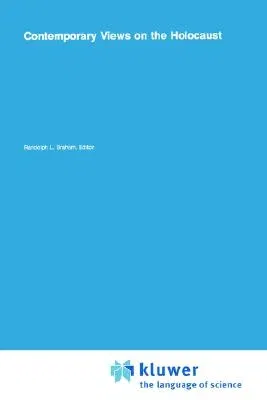Contemporary Views on the Holocaust (1983)Hardcover - 1983, 31 July 1983

Qty
1
Turbo
Ships in 2 - 3 days
In Stock
Free Delivery
Cash on Delivery
15 Days
Free Returns
Secure Checkout

Part of Series
Holocaust Studies
Part of Series
East European Monograph
Print Length
238 pages
Language
English
Publisher
Springer
Date Published
31 Jul 1983
ISBN-10
089838141X
ISBN-13
9780898381412
Description
Product Details
Book Edition:
1983
Book Format:
Hardcover
Country of Origin:
US
Date Published:
31 July 1983
Dimensions:
23.39 x
15.6 x
1.6 cm
Genre:
1940's
ISBN-10:
089838141X
ISBN-13:
9780898381412
Language:
English
Location:
Dordrecht
Pages:
238
Publisher:
Weight:
526.17 gm